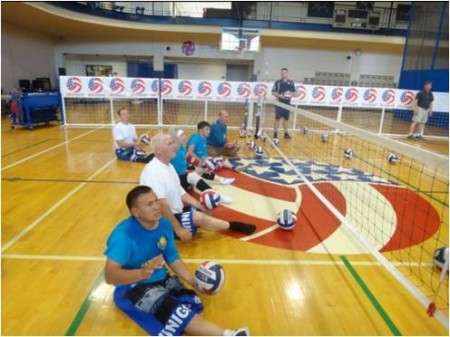The power and the impact of sport is undeniable.
Serving many functions in our lives, sport works to develop communication skills and promote teamwork, all the while bringing communities together as one. Perhaps lesser known, sport can also promote a world of peace and cross-cultural understanding that is stronger than any barrier languages and cultures may build.
“You don’t need to speak the same language because you are out there just playing and competing in sports,” said Craig Esherick, Associate Director of the Center for Sport Management.
In many ways, the language of sport is the only universal language in the world.
Through a grant awarded by SportsUnited, a division of the U.S. Department of State’s Bureau of Educational and Cultural Affairs, Mason professors Esherick, Dr. Bob Baker and Dr. Pam Baker have been working in a diplomatic effort to promote peace and shape the world view on America and its citizens.
“More than anything, we overcome linguistic challenges by having strong interests in the American culture,” said Marlon Moreno, a Mexican coach who visited the United States as part of the program in mid-August.
Esherick and Bob Baker began working with the State Department on a new sport initiative in the fall of 2009, beginning a program with India that would send the duo to India on two separate occasions and allowing them to host an instructional and cultural program on campus.
“It’s a relatively new area of interest to use sport for these cultural exchange, community development and economic development,” said Bob Baker, who directs the Center for Sport Management. “All of this because sport is such a significant social institution.”
They continued their work for the duration of the first grant before earning a cooperative agreement worth about $2.2 million to date that has allowed them to host 28 different groups of people from around the world.
“Part of the proposal required us to address the institution’s commitment to diversity,” Bob Baker said. “That’s really easy to do at Mason.”
After solidifying the cooperative agreement, Esherick and Bob Baker brought Pam Baker aboard – as a way to introduce the foreign sports diplomats to inclusive sport, which focuses on ways to include people with disabilities in sport. The three professors also brought a program host, Socrates Manuel, and a program facilitator, B.J. D’Urso, to the team to make delivery of the program possible.
Despite not getting the opportunity to choose their visitors, the team handles all the logistics of the trip and facilitates a program that allows each group the opportunity to experience elements of American culture and sport such as high school athletic programs, collegiate athletic programs, the professional industry, sport-specific training, team building, tours Washington, DC or other locations, and a home hospitality dinner.
“We try to expose them to the industry in this country,” Bob Baker said. “We give them an idea of how the industry was created in this country so they can go back and mimic that in their own country.”
As diplomats for the United States, Esherick, Bob Baker and Pam Baker work to ensure that each of their groups has a positive experience in the states.
They provide pre- and post-program surveys to each of the participants to gage the perception of American people and American culture, and have found a unique niche designed to impact the world through sport.
“The purpose of this program is to have these people go back and spread a positive word about America and American people,” Bob Baker said. “In terms of the evaluation, both qualitative and quantitative, there is a significant difference in their impressions of the U.S.”
While putting together a majority of these programs, Esherick and the Bakers have exposed the university to a wide variety of individuals. They have solicited help from more than 20 faculty members and coaches within the university and have had help from many more student athletes, Sport Management students and students of other majors throughout Mason. Staff members from numerous offices across campus have also made this project possible to deliver.
“We have always found people who have said, ‘We will find a way to make it work,’” Bob Baker said. “That has been the [Modus operandi] at Mason. We can find people who are willing to find a way to make it work and will not just say, ‘No.’”
Realizing the undeniable success of this program, the Department of State continues to invest money in using sport as a tool for diplomacy.
“This is an area of global interest and it is huge,” Bob Baker said. “And Mason’s Center for Sport Management is right in front of it.”







Comments